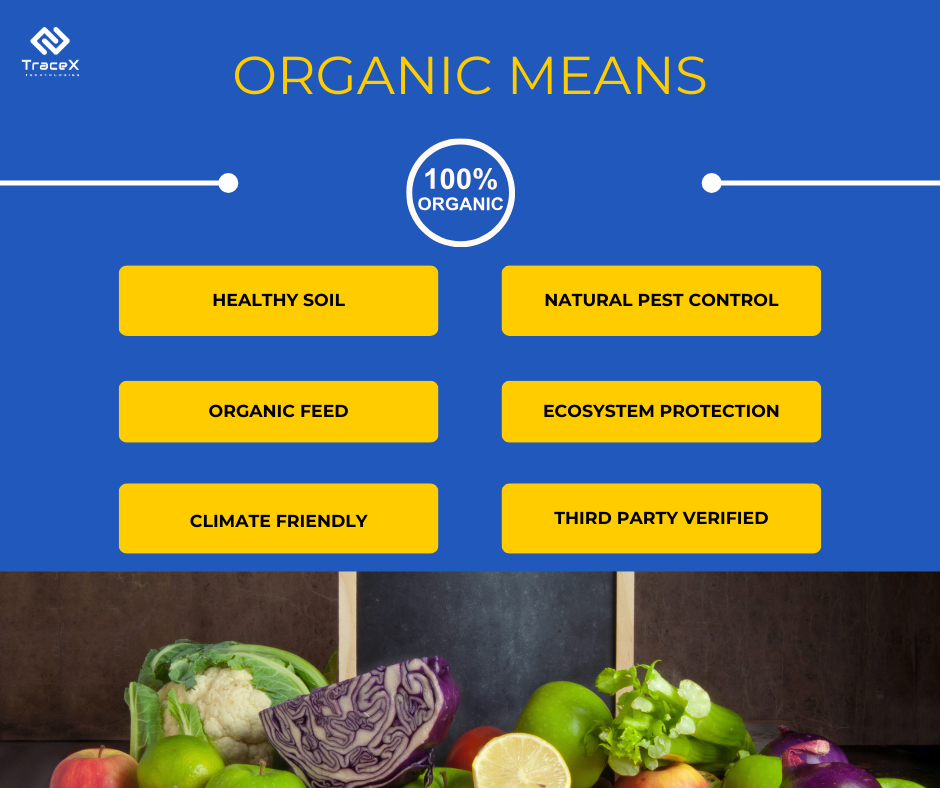Contact: +91 99725 24322 |
Menu
Menu
Quick summary: Discover the transformative power of organic certifications in agriculture with our latest blog. Uncover the four compelling reasons why obtaining organic certifications is a game-changer for farmers. From eco-friendly practices to premium market access, explore the benefits that elevate both sustainable farming and market success. Read now and unlock the potential of organic certifications in shaping a healthier, more prosperous agricultural landscape.

Embarking on the journey towards sustainable and environmentally conscious agriculture, the significance of organic certifications is of great importance. In the realm of modern agriculture, where consumers increasingly prioritize health, environmental impact, and ethical practices, obtaining organic certifications has become paramount. The surge in interest in organic agriculture reflects a global shift towards sustainable and environmentally friendly food production. Organic farming, eschewing synthetic pesticides and fertilizers, gains credibility through certifications that set rigorous standards. Certifying bodies, such as USDA Organic or EU Organic, play a pivotal role in establishing the authenticity of organic products. These certifications not only ensure adherence to organic principles but also reassure consumers about the quality and ethical practices of the produce.
Organic Certifications guarantee that consumers receive products that meet specific standards. Many American consumers are willing to pay a premium, up to 116% above the market price, for the assurance that a product is organic.
This blog explores the pivotal role of organic certifications in agriculture, shedding light on how these certifications not only guarantee the quality of produce but also signify a dedication to eco-friendly farming practices. Join us on a voyage to understand the importance of organic certifications, the stringent criteria they entail, and the positive ripple effect they create in fostering a healthier planet and a more conscientious agricultural landscape.
Organic certifications are official designations confirming that agricultural products comply with specific standards and criteria set for organic farming practices. These certifications, issued by accredited organizations, assure consumers that the products are produced in accordance with environmentally sustainable and organic principles. The standards typically encompass restrictions on synthetic pesticides, genetically modified organisms, and chemical fertilizers, emphasizing soil health, biodiversity, and animal welfare.
The certification process involves rigorous inspections and documentation reviews. Farmers must demonstrate adherence to organic farming standards, detailing their cultivation practices, soil management, and pest control methods. The certification process ensures transparency and accountability throughout the supply chain. Once certified, products can carry labels like “USDA Organic” or equivalent, providing consumers with a recognizable symbol of the product’s organic integrity and adherence to environmentally conscious farming practices.
Organic certifications serve as a robust guarantee of the absence of synthetic pesticides and fertilizers in agricultural practices. To obtain certification, farmers must adhere to strict standards that prohibit the use of synthetic chemicals. This involves detailed documentation of cultivation methods, soil management, and pest control strategies. Rigorous inspections verify compliance, providing consumers assurance that products labeled as “organic” are free from harmful synthetic inputs.
Certifications play a crucial role in ensuring the safety of food products by establishing comprehensive criteria for organic farming. This includes restrictions on genetically modified organisms and synthetic additives. The certification process involves thorough testing, audits, and traceability measures, reinforcing the integrity of the organic supply chain. Consequently, consumers can trust that certified organic products are produced with their safety in mind, reducing exposure to potentially harmful residues.
The impact on consumer health and well-being is significant, as choosing certified organic products minimizes exposure to synthetic pesticides linked to health concerns. By opting for certified organic goods, consumers make informed choices that align with their health-conscious lifestyles and contribute to the broader shift towards sustainable and safe agricultural practices.
2. Environmental Sustainability
Organic certifications play a pivotal role in promoting sustainable agricultural practices, fostering positive impacts on soil health, water conservation, and biodiversity. Organic farming, as stipulated by certifications, encourages practices like crop rotation, cover cropping, and the limited use of external inputs. These methods enhance soil structure, reduce erosion, and promote microbial diversity, contributing to overall soil health.
Certified organic farming also emphasizes water conservation through efficient irrigation practices and reduced reliance on synthetic chemicals that can contaminate water sources. Additionally, the prohibition of genetically modified organisms (GMOs) in organic farming helps preserve biodiversity by preventing the unintended environmental consequences associated with GMO cultivation.
Real-world examples of successful organic farming initiatives include the Rodale Institute’s Farming Systems Trial, showcasing improved soil health and yields over time. Moreover, initiatives like the Chaffin Family Orchards in California highlight how organic practices contribute to water conservation and biodiversity, creating models for sustainable agriculture with positive ecological impacts.
3. Building Consumer Trust
The food industry is witnessing a growing demand for transparency, with consumers increasingly seeking information about the origin and production practices of their food. In this context, organic certifications play a crucial role in building trust and confidence. These certifications provide a clear and standardized way for consumers to verify that food products meet specific organic standards, offering transparency about farming practices and adherence to environmental and ethical principles.
Statistics and case studies affirm the impact of certifications on purchasing decisions. According to surveys, a significant percentage of consumers prioritize products with organic certifications, viewing them as a symbol of quality and sustainability. For instance, a study by the Organic Trade Association revealed that sales of organic products in the United States have experienced consistent growth, reflecting the increasing consumer preference for transparency and environmentally conscious choices. The transparency offered by organic certifications acts as a powerful influencer in shaping consumer behavior and fostering a more sustainable food industry.
4. Farmer Empowerment
Organic certifications in farming offer a myriad of benefits for farmers, extending beyond the fields to positively impact both their agricultural practices and market standing. Firstly, acquiring an organic certification validates a commitment to environmentally friendly and sustainable farming methods. By eschewing synthetic pesticides and fertilizers, farmers contribute to soil health, water quality, and overall ecosystem preservation.
Moreover, organic certifications often translate to improved market access and higher product demand. With an increasing number of consumers prioritizing health and sustainability, the organic label serves as a powerful marketing tool, attracting a growing market segment willing to pay a premium for organically certified products.
In addition, organic farming practices typically entail crop rotation, composting, and other strategies that promote long-term soil fertility, reducing the need for costly external inputs. This not only contributes to cost savings for farmers but also enhances the resilience of their farming systems. Farmers within the organic farming network often share knowledge, resources, and best practices, creating a supportive environment for continuous improvement and innovation.

Organic certifications in farming offer a holistic set of advantages that encompass environmental conservation, economic viability, and the well-being of both consumers and farming communities.
TraceX blockchain-powered traceability solutions play a crucial role in facilitating and enhancing the process of achieving organic certifications in farming.
In conclusion, the surge in interest and demand for organic certifications reflects a global shift towards more transparent, sustainable, and environmentally conscious food production. While challenges persist in obtaining and maintaining these certifications, farmers have access to resources and support systems that facilitate their journey towards organic practices. The significance of certifications extends beyond guaranteeing the absence of synthetic inputs; they serve as beacons of trust for consumers, fostering a deeper connection to the origins of their food.
As the food industry evolves, certifications play a pivotal role in promoting sustainable agriculture, positively impacting soil health, water conservation, and biodiversity. These certifications not only ensure the safety of food products but also empower consumers to make informed choices aligned with their values. Real-world success stories exemplify the transformative potential of organic certifications, inspiring a broader transition towards resilient, ethical, and environmentally friendly farming practices. In essence, organic certifications stand at the forefront of a paradigm shift, forging a path towards a more sustainable and transparent future in the food industry.
